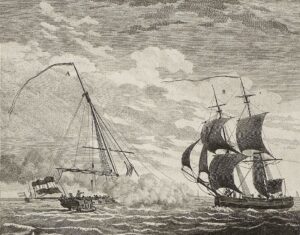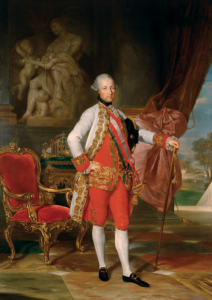 War is often a very strange phenomenon. Some wars go on for years, while others for just one day. On such “war” was the infamous Kettle War. The war was between the Holy Roman Empire and the laughably outmatched Northern Netherlands and took place on October 8, 1784. The war was a one-battle wonder!! The events leading up to the war were a series of political upheavals and rebellions, culminating with the Northern Netherlands seceding from the Empire. That maneuver was one that would cut them off from some pretty important trading harbors. As you can imagine, Emperor Joseph II was none too pleased at this turn of events. In retaliation, he sent three warships to remove the blockade.
War is often a very strange phenomenon. Some wars go on for years, while others for just one day. On such “war” was the infamous Kettle War. The war was between the Holy Roman Empire and the laughably outmatched Northern Netherlands and took place on October 8, 1784. The war was a one-battle wonder!! The events leading up to the war were a series of political upheavals and rebellions, culminating with the Northern Netherlands seceding from the Empire. That maneuver was one that would cut them off from some pretty important trading harbors. As you can imagine, Emperor Joseph II was none too pleased at this turn of events. In retaliation, he sent three warships to remove the blockade.
Strangely, the Northern Netherlands sent only one ship, the Dolfijn. While three warships isn’t that many, it still seems foolhardy to send just one ship to take on three. Maybe it was an odd thing to do, but nothing compared to what was to follow. The battle began with a standoff. Then, the Dolfijn fired a single shot. The bullet hit no one. Strange as that is, what it did hit made the situation even more strange. The bullet hit a kettle of soup on the deck of enemy ship Le Louis. The kettle sprayed its passengers with the thick liquid. To me, that seems like a really bad shot, but that was not how the men on the Le Louis saw the situation very differently. It’s hard to say what might have been going through their minds, but the crew was instantly terrified. It’s not clear whether they were astounded by the accuracy of the shot or terrified of their apparently insane enemies, buy the Empire forces immediately surrendered. Three shiploads of military men surrendered after being missed by a bullet that basically spilled the soup. Explain that to the powers that be.
As a consequence of this short skirmish, and under the mediation of France, negotiations were reopened between the countries. This led in 1785 to the Treaty of Fontainebleau. It was decided that the Scheldt would remain closed to shipping, but that the southern Netherlands would be compensated for this by the Republic. At a rough estimate the Republic paid 2 million guilder (according to other sources 10 million guilder), which equates to 1,099,000 or 5,495,000 US dollars, depending on which estimate is correct. Soon, agreements were made between Belgium and the Netherlands about allowing access the Scheldt. As a result of the war came the decline and fall of Duke Louis Ernest of Brunswick-Lüneburg, who was the advisor to the Dutch stadtholder, who was accused of favoring the enemy due to his familial ties to Joseph. As for Belgium and the Netherlands, at least for now, there was a peaceful agreement on the use of the Scheldt.


Leave a Reply